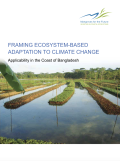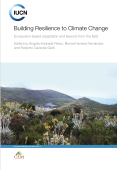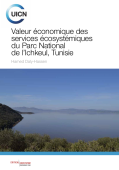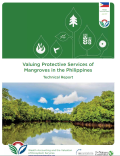This case study, Entry Points for Mainstreaming Ecosystem-based Adaptation - The Case of Peru , analyses the enabling and hindering factors with regards to the institutional setting, policy and legal framework as well as capacity and awareness, and shares lessons learned on Ecosystem-based Adaptation mainstreaming in Peru.
This case study, Entry Points for Mainstreaming Ecosystem-based Adaptation - The Case of Philipines , is conducted by GIZ in Philipines to understand the entry points of Ecosystem-based Adaptation (EbA), and who were the pivotal parties, and how EbA can be further expanded in each country in the future. This study also stresses the importance of including EbA in the Climate Change Cluster on Adaptation and MitigationDisaster Risk Reduction agenda.
This case study, Entry Points for Mainstreaming Ecosystem-based Adaptation - The Case of South Africa , is conducted by GIZ in South Africa to understand the entry points of Ecosystem-based Adaptation, and who were the pivotal parties, and how EbA can be further expanded in each country in the future. This report is a comprehensive review of existing policy and strategy was made, which was followed by a set of interviews with parties located in government as well as private sector organizations who have often led on-the-ground activities to date.

This collection aims to provide a reference for policy makers and practitioners working to scale up bioenergy in rural areas of sub-Saharan Africa. Energy, agriculture, forestry, environment, finance and business experts all seek for solutions to provide energy and also enhance food security, social welfare and environmental sustainability.

This case study, Framing Ecosystem-based Adaptation to Climate Change: Applicability in the coast of Bangladesh , describes six different types of EbA currently being practiced in the coastal zone of Bangladesh; and an analysis is made in line with the ecosystem services derived from such ecosystem-based interventions, including relevant policy and institutional aspects.

This publication, Building Resilience to Climate Change: Ecosystem-based adaptation and lessons from the field , contains eleven case studies covering different ecosystems and regions around the world. Its aim is to summarize some current applications of the Ecosystem-based Adaptation (EbA) concept and its tools used around the world, and also draw lessons from experiences in conservation adaptation.

This case study, The Economic Value: Shouf Biosphere Reserve , is aiming to describe, in preliminary terms, the economic value of the Shouf Biosphere Reserve (SBR), Lebanon, by valuing carbon sequestration, fuel provision (briquettes production), water provision, food provision, tourism, and cultural services and patrimonial values.

This case study, Economic Value of Ecosystem Services in Ichkeul National Park, Tunisia , aims to assess the economic value of ecosystem services provided by the Ichkeul National Park (INP), with the objective to increase awareness among decision-makers and users to ensure the conservation and sustainable use of the different components of natural capital and biodiversity present within the park.

This report, Consultation Draft for the Zambia Water Account , represents the first ever attempt at producing water accounts for the Republic of Zambia, following the System of Environmental Economic Accounting (SEEA), which aims at giving stakeholders an opportunity to provide feedback to the work so far, such that a better version of the water accounts can be produced.

This Technical Report, Valuing Protective Services of Mangroves in the Philippines: Technical report, provides a social and economic valuation of the flood protection benefits from mangroves in the Philippines. This work aims to support decisions across development, aid, risk reduction, and conservation sectors as they seek to identify sustainable and cost-effective approaches for risk reduction. Using high-resolution flooding models, the Report examines the flooding that would occur with and without mangroves under different storm conditions throughout the Philippines and estimates the annual expected benefits of mangroves for protecting people and property in social and economic terms.
